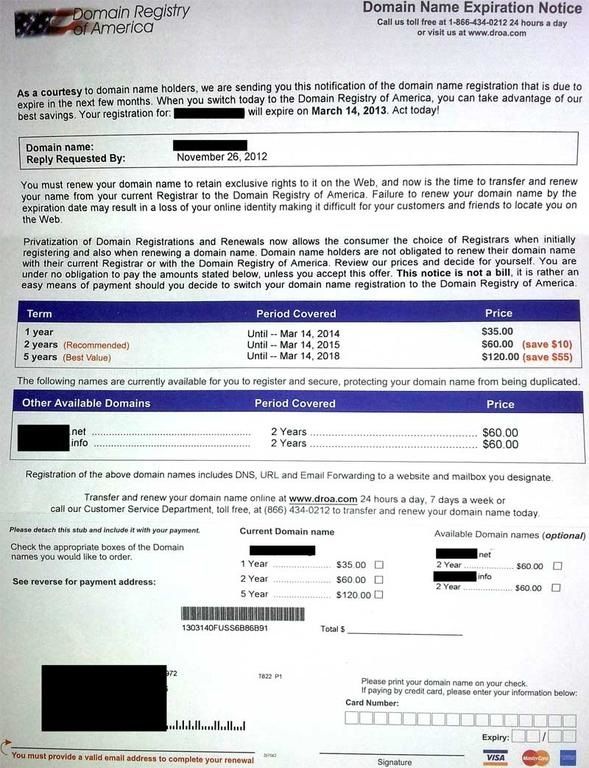If you’ve owned a website or run a blog with a registered domain name for long enough, you may have received several seemingly credible invoices by mail or another medium, asking for several hundred dollars for domain renewal.
All of these invoices look so credible, sporting a logo, a return address, an email, and a phone number: you would be forgiven for actually thinking them authentic!
It’s time you learned how to identify scams that target domain owners by asking them to pay for fake domain renewals.
When you registered your domain name, you were required to submit details like your postal mailing address and email address. Both addresses can easily be accessed by anyone who runs a simple “whois” query on your domain name.
Scammers are working overtime, lifting the postal addresses and email addresses from the “Whois” info for every domain they come across, and then using this information to send credible-looking--though scam--invoices for renewing the domain.

One of the more common ones that we see and hear about is DROA (Domain Registry of America). Their paper mailed letter can look incredibly real and can often scare folks into switching their domain name services over to them and many times having disruptions of their hosting and email services.
It is not surprising that DROA has a D+ Rating with Better Business Bureau.
Here are 3 ways to spot fake domain renewals so you don’t fall victim:
1. Renewal notices are delivered by email 99.9% of the time.
If you received any notification or invoice via post you can be almost certain that a scammer is at work behind the scenes, trying to fleece you of your hard-earned money for nothing in return.
2. Only the domain registrar with whom your registered your domain will be able to send you a legitimate renewal notice.
Dump it in the thrash if you hear from another company, no matter how credible they may appear.
For example, if your domain is registered at Godaddy and you have another company notifying you of renewal, then you can be certain that an attempt is being made to scam you of your hard earned money.
3. When the cost of renewal is several times higher than what you paid for the domain name, rest assured that scammers are at work.
Another variation to the scam involves offering to “promote” your website or blog through “Search Engine Registration” services.
Obviously, this is a service you don’t need thanks to Google and Bing already having having automated crawlers capable of finding external links to your website on their own. But these “Search Engine Registration” service offers are disguised to look like domain renewal notices and can appear pretty genuine if you don’t know any better.
If you receive any domain “promotion” offers or “invoices” for renewal, as we have described, in your physical inbox or email, feel free to do the following:
1. Check with your current domain registrar or reach out to your web developer to ask them if it looks legitimate
2. Toss the paper invoice you received into the trash can.
3. Log into your account at your real domain registrar’s website and check your domain renewal status. If your domain is indeed due for renewal, you will be able to do it from the account.
4. Setup what is called a "Private Domain Registration" - this can be added on to your domain name so that it hides all of your contact information and thus prevents these scams via email, phone and postal mail.
When it comes to renewing domain names, you want to deal ONLY with your domain’s current registrar, unless you are unhappy with their services and wish to make a switch.
Before you switch to another registrar, make sure you do your due diligence about the company and make sure they are trustworthy before asking them to transfer your domain from your current registrar to them.
Stay sharp, and stay ahead of these scammers.

